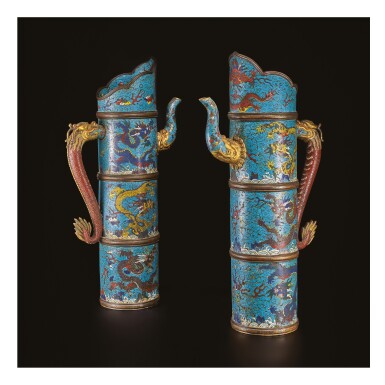Important Chinese Art
Important Chinese Art

PROPERTY FROM A FLORIDA ESTATE
A PAIR OF CLOISONNE ENAMEL TIBETAN-STYLE 'DRAGON' EWERS, DUOMUHU, 17TH CENTURY
Auction Closed
September 23, 08:35 PM GMT
Estimate
50,000 - 70,000 USD
Lot Details
Description
A PAIR OF CLOISONNE ENAMEL TIBETAN-STYLE 'DRAGON' EWERS, DUOMUHU
17TH CENTURY
十七世紀 銅胎掐絲琺瑯海水趕珠龍紋多穆壺一對
each of cylindrical section subdivided into three registers with horizontal gilt-copper bands incised with foliate scroll, below a lobed crown rim resembling a monk’s cap, an enameled spout issuing from the mouth of a gilded mythical beast with a collar of curled tufts of fur, set opposite an 'S'-curved dragon-headed handle with a scaly up-turned fishtail body of red cloisonné, each of the body's registers with a pair of confronting five-clawed dragons enameled in blue, yellow, and aubergine, writhing among ruyi cloud scrolls and flame wisps in pursuit of 'Flaming Pearls' above tumultuous waves crashing on rocky mountains, all reserved against a turquoise ground of clouds, the top crown similarly decorated on the front with a frontal red dragon curled around a 'Flaming Pearls' amidst cloud scrolls and flame wisps, the interior of the crown with a large 'Flaming Pearls', the circular cover with a front-facing red-enameled dragon coiled around a gilt bud finial (4)
Height 24¼ in., 61.6 cm
Jacques Barrère, Paris, 1982.
來源
Jacques Barrère,巴黎,1982年
This pair of ewers are modeled after Tibetan prototypes and are known as duohumu, meaning ‘bucket of snow’. Ewers of this type were originally used in lamaist monasteries for storing butter, milk or wine. Originally made of wood with metal bands, the humble vessel was reinterpreted in various materials including cloisonné enamel, and thus transformed into a luxurious piece appropriate for use at court.
A closely related ewer was included in the exhibition Chinese Cloisonné. The Pierre Uldry Collection, Asia Society, New York, 1989, cat. no. 159; another is illustrated in Dr. Gunhild Avitanile, Die Ware aus dem Teufelsland, Hannover, 1981, pl. 59; and a third in the George Walter Vincent Smith Art Museum, Springfield, Massachusetts, was included in the exhibition Cloisonné: Chinese Enamels from the Yuan, Ming, and Qing Dynasties, Bard Graduate Center, New York, 2011, cat. no. 90. See also a closely related pair of ewers sold in our Hong Kong rooms, 8th April 2014, lot 3104; and a further example sold in these rooms, 21st-22nd September 2005, lot 212.
